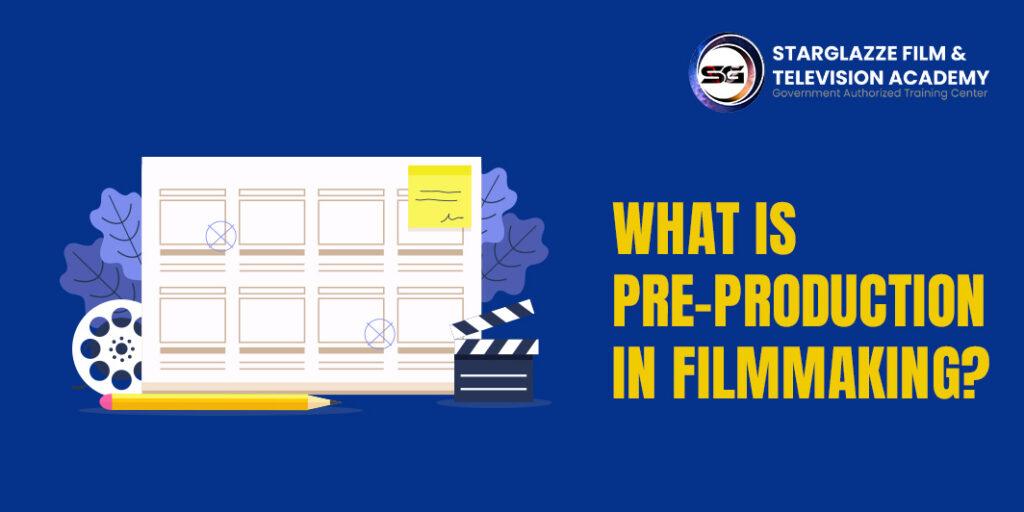Pre-production is one of the most important phases in the filmmaking process. It lays the groundwork for a successful film shoot and ensures that the production runs smoothly. Starglazze is one of the top institutes for filmmaking courses in Pune. Pre-production with Starglazze isn’t just about ticking boxes – it’s about igniting your passion and making you fall in love with the process. It’s where the magic truly begins, not just on screen, but in your heart. Through this blog, we will help you understand what is pre-production in filmmaking and how it contributes to the finished film.
What is Pre-production in Filmmaking?
Pre-production refers to the planning and preparation phase that takes place before the principal photography or filming begins. It involves activities like selecting the script, developing a budget, hiring key crew members, obtaining necessary equipment and permits, scouting for locations, and designing production schedules and shot lists. This phase is crucial as it helps the filmmakers visualize how to execute their vision and plan all the logistical aspects of the production.
Key Elements of Pre-production
Some of the main components of pre-production include:
1. Script/ Story Development: Fine-tuning the screenplay or story through rewrites and polishing dialogue. This also involves obtaining film rights and legal clearances.
2. Casting: Auditioning and hiring actors for the roles in consultation with the director.
3. Budgeting and Fundraising: Creating a detailed budget projection and raising finances through private investors or crowdfunding platforms.
4. Location Scouting: Finding and securing the ideal filming locations that match the script requirements. This includes obtaining permits.
5. Production Design: Conceptualising set designs, costumes, props, makeup etc. within the budget constraints.
6. Crew Hiring: Assembling the necessary production crew like cinematographer, art director, sound designer etc.
7. Scheduling: Creating a production schedule breaking down the script into shooting days and scenes.
8. Equipment Rental: Booking camera, lighting gear, grip and other equipment as per the shooting needs.
9. Permits and Insurance: Obtaining necessary filming permits and production insurance coverage.
10. Testing Crew and Equipment: Holding test shoots to check the cameras, lenses, lighting and crew coordination.
The pre-production phase concludes after creating detailed plans, budgets, schedules, and contracts and acquiring all necessary resources for embarking on principal photography.
Importance of Pre-production
A well-planned pre-production period allows filmmakers to:
- Visualize the overall production design before going on set.
- Work out technical and budgetary aspects in advance to avoid delays on shoot days.
- Scout and finalize ideal filming locations suited to the story early on.
- Hire the most suitable cast and crew members for the roles.
- Arrange for permits, insurance and legalities well before commencing shoots.
- Schedule shoots efficiently based on script breakdown and availability of resources.
- Test equipment and crew coordination through trial sessions.
- Foresee potential challenges and devise solutions beforehand.
- Stay within the estimated budget and production timeline.
Pre-production thus plays a defining role in determining the film’s production values and post-production prospects. Good pre-planning at institutes like Starglazze helps budding filmmakers execute their projects seamlessly.
Pre-production Roles at Starglazze
During the filmmaking and film direction courses in Pune, our students at Starglazze get hands-on experience in various pre-production roles like:
Assistant Director: Helping with script breakdowns, schedules, and casting calls.
Location Manager: Scouting spots, liaising with owners and coordinating logistics.
Production Designer: Conceptualizing sets, costumes, and props within budgets.
Director of Photography: Choosing camera systems, and lenses, testing lighting ideals.
Production Manager: Overseeing budgeting, hiring, schedules, and permissions.
Line Producer: Obtaining estimates, approvals, booking resources and vendors.
This gives practical insights into the planning aspects of filmmaking before the shoot begins. The pre-production classes and projects at Starglazze prepare students for industry workflows. Students can find work with production houses, ad film units, OTT platforms and more. Many past students are working successfully in the television and film industries today after receiving comprehensive training at Starglazze.
The Bottom Line
To sum up, pre-production is the vital behind-the-scenes phase that sets the foundation for any film project. The dedicated pre-production training and courses at Starglazze Film Institute help nurture efficient professionals ready to take on industry jobs. For the best filmmaking courses in Pune and guidance on pursuing a career in this field, get in touch with Starglazze today!

